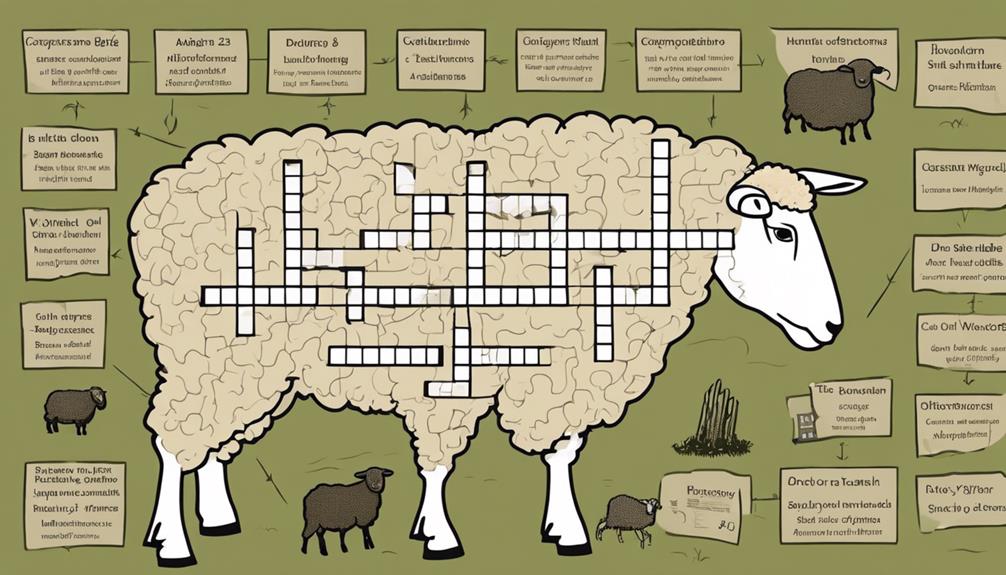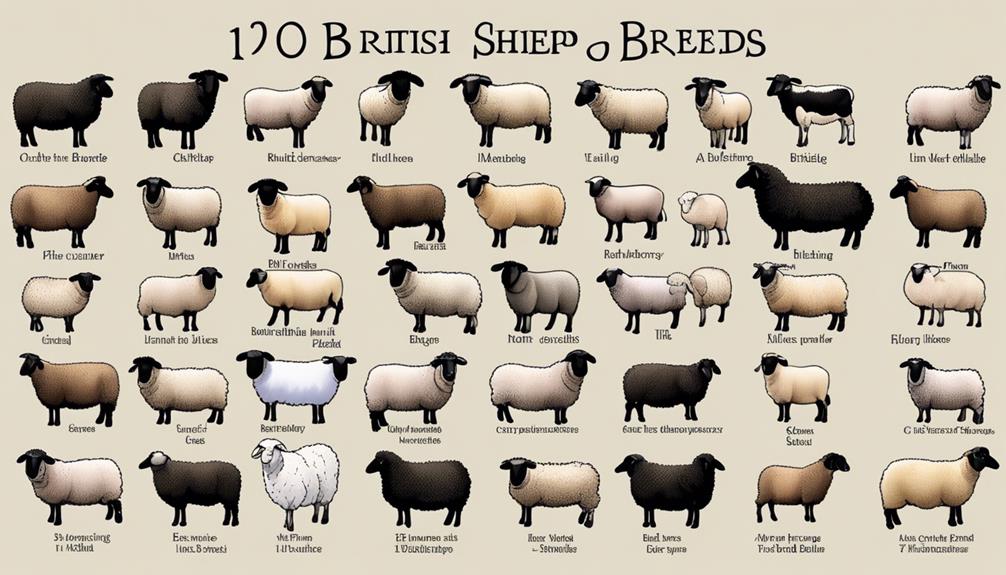Looking for a British sheep breed crossword clue? The answer you seek is "Dorset." Get ready to explore the fascinating world of British sheep breeds and uncover interesting facts about their history, characteristics, and much more. Stay tuned to discover the unique qualities of various popular and rare British sheep varieties. Get ready to enhance your understanding of these remarkable animals and their significance in the agricultural landscape. Get ready to unravel the mysteries and complexities surrounding the diverse array of British sheep breeds.
Key Takeaways
- Suffolk sheep feature black faces and legs, aiding in breed identification.
- Scottish Blackface sheep are recognized by their black faces and distinctive curled horns.
- Bluefaced Leicester sheep are prized for their exceptionally soft and lustrous wool.
- Wool processing methods can help in identifying specific British sheep breeds.
- Physical characteristics and behavioral traits play a crucial role in distinguishing different British sheep breeds.
History of British Sheep Breeds

Explore the rich history of British sheep breeds and their significant contributions to agriculture and the textile industry. British sheep breeds have played an essential role in shaping the wool industry and upholding the agricultural heritage of the region. These breeds have been selectively bred over centuries to produce high-quality wool that's sought after worldwide.
The agricultural heritage of British sheep breeds dates back to ancient times, with different regions developing distinct breeds suited to their specific climates and terrain. For example, the hardy Scottish Blackface sheep thrives in the rugged landscapes of Scotland, while the Dorset sheep excels in the milder conditions of Southern England.
In the textile industry, British wool is renowned for its superior quality and versatility. The fine fibers of breeds like the Bluefaced Leicester produce luxurious yarns prized by knitters and weavers. Additionally, the hardwearing nature of wool from breeds such as the Border Leicester makes it ideal for carpets and upholstery fabrics.
British sheep breeds continue to play a significant role in sustaining both the wool industry and the agricultural traditions of the region.
Characteristics of British Sheep
British sheep breeds exhibit a diverse range of characteristics that make them well-suited for various agricultural and textile applications. When it comes to wool production, British sheep are renowned for their high-quality fleece, which is prized for its softness, warmth, and durability. Different breeds have varying wool characteristics, with some producing fine wool ideal for clothing, while others have more coarse wool suitable for carpets or insulation.
In terms of sheep farming, British sheep are valued for their adaptability to different climates and terrains. They're known for their hardiness, ease of care, and ability to thrive in various conditions, making them popular choices for farmers looking to raise sheep for meat, wool, or both. Additionally, many British sheep breeds are excellent grazers, helping to maintain pastures and contribute to sustainable agricultural practices.
Popular British Sheep Breeds

Among the popular sheep breeds in Britain, you can find a wide variety that are well-known for their unique characteristics and contributions to agriculture. When it comes to wool production, breeds like the Bluefaced Leicester and the Border Leicester stand out for their high-quality fleece, which is sought after by textile industries.
Farmers often implement selective breeding practices to enhance desirable traits in breeds such as the Suffolk and the Dorset Horn. These practices aim to improve genetic diversity and overall flock health.
The essential impact of popular British sheep breeds can't be understated. Breeds like the Hampshire Down and the Southdown play a significant role in the agricultural economy, providing meat and wool products that contribute to the country's agricultural output.
Conservation efforts are vital to preserving genetic diversity in these breeds, ensuring their long-term sustainability. Organizations focus on maintaining breed standards and promoting responsible breeding practices to safeguard these valuable genetic resources.
Rare British Sheep Varieties
To explore the world of rare British sheep varieties, you must shift focus from the well-known breeds to those less commonly seen in agriculture. These rare varieties play an important role in maintaining genetic diversity within sheep populations. Conservation efforts are underway to preserve these breeds and the unique traits they possess.
Sheep breeding techniques are essential in ensuring the longevity of these rare British sheep varieties. By employing selective breeding methods, farmers can maintain the distinct characteristics of these breeds, such as their unique wool textures. These textures vary from breed to breed, ranging from fine and soft to robust and coarse.
Preserving rare British sheep varieties is crucial not only for their historical significance but also for the sustainability of the agricultural industry. Through conservation initiatives and strategic breeding practices, these lesser-known breeds can continue to thrive, contributing to the overall richness and diversity of the sheep population in the United Kingdom.
Identifying British Sheep Breeds

When looking to identify different breeds of sheep in the United Kingdom, it's essential to pay attention to specific physical characteristics and behavioral traits. Sheep breeding techniques play a pivotal role in determining the distinct features of each breed.
For example, the Suffolk sheep are known for their black faces and legs, while the Scottish Blackface sheep have a black face with curled horns. Understanding these characteristics can help you differentiate between breeds such as the Dorset and the Hampshire sheep, which have unique wool textures and colors.
Moreover, wool processing methods also contribute to identifying British sheep breeds. The Bluefaced Leicester sheep, for instance, produces high-quality wool that's prized for its softness and luster. On the other hand, the Welsh Mountain sheep yield a denser fleece suitable for durable textiles.
Crossword Clue Solution Revealed
Let's now reveal the solution to the crossword clue you've been eagerly anticipating. Cryptic clues can be tricky, but with some tips and a bit of brainstorming, cracking them becomes a satisfying challenge. Here's the answer to the British Sheep Breed crossword clue: 'DORSET HORN.'
For your next game night, consider incorporating more brain teasers like crossword puzzles to keep everyone engaged and entertained. Cryptic clues, in particular, are great for stimulating critical thinking and problem-solving skills. To help you master these puzzles, here are a few crossword puzzle tips:
- Break it down: Start by looking at each word in the clue individually to understand its possible meanings.
- Consider wordplay: Cryptic clues often involve wordplay, such as anagrams or homophones.
- Use the grid: Fill in the easier answers first to give you clues for the more challenging ones.
| DORSET | HORN | |
|---|---|---|
| SHEEP | BREED | BRITISH |
Fun Facts About British Sheep

Discover some fascinating facts about British sheep that will surprise and delight you. Sheep farming practices in Britain have a long history, with the country being known for its high-quality wool production. The lush green pastures and mild climate provide ideal conditions for raising sheep, making it a significant part of British agriculture.
Various sheep breeds have found their way into popular culture and folklore. The iconic image of the fluffy white sheep grazing on rolling hills is a common sight in paintings, poems, and stories. Breeds like the Scottish Blackface, Suffolk, and Welsh Mountain sheep are often featured in traditional tales and songs, highlighting their importance in British heritage.
Sheep have played an important role in shaping the countryside and economy of Britain. The wool industry, once a cornerstone of the economy, has evolved over time but remains an essential part of the agricultural sector. From providing wool for textiles to maintaining the landscape through grazing, British sheep continue to hold a special place in the country's cultural tapestry.
Conclusion
You've now learned about the history, characteristics, and popular varieties of British sheep breeds.
Hopefully, this information has helped you identify the breed in the crossword clue.
Next time you see a flock of sheep grazing in the countryside, you'll be able to recognize and appreciate the diversity of British sheep breeds.
Keep exploring and discovering new facts about these fascinating animals!